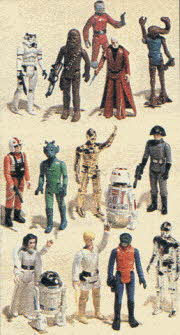On November 12, 1980, more than 3 years after it's launch, the U.S. planetary probe Voyager 1 beamed pictures of Saturn back to California. The pictures stunned scientists and showed moons and hundreds of rings that were previously undiscovered.
http://www.history.com/this-day-in-history/voyager-i-flies-near-Saturn

On May 22, 1980, the Pac-Man video game was released in Japan and by October of the same year it was released in the United States. The yellow, pie-shaped Pac-Man character, who travels around a maze trying to eat dots and avoid four mean ghosts, quickly became an icon of the 1980s. To this day, Pac-Man remains one of the most popular video games in history.
http://history1900s.about.com/od/1980s/qt/Pac-Man.htm
In 1980, Post-It Notes were first sold in the United States and immediately became a hit. They were invented by Spencer Silver and Arthur Fry.
http://www.post-it.com/wps/portal/3M/en_US/Post_It/Global/About/History/













